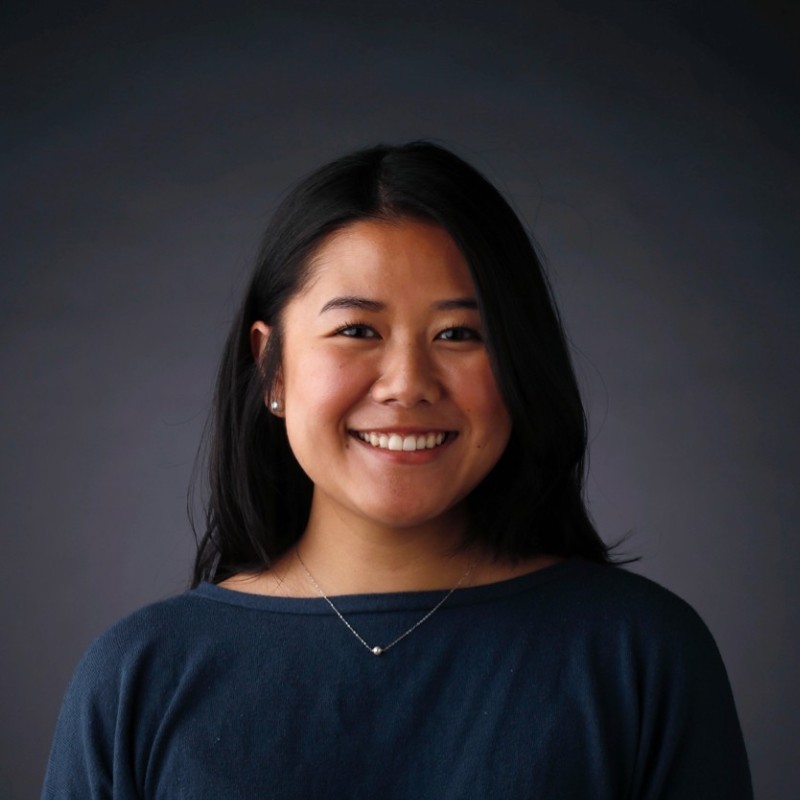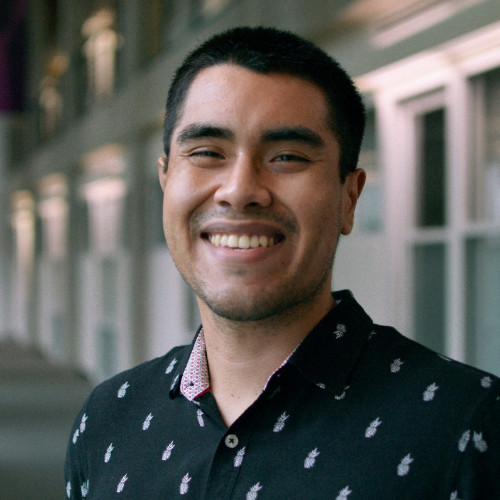Comet Conversations: Alumni Share What It’s Like to Work in Media
By: Development Communications | November 12, 2021
Alumni News

By Melissa Graham | November 9, 2021
As seasoned Dallas-based journalists, Nataly Keomoungkhoun BA’16 and Miguel Perez BA’15 have spent years reporting for The Dallas Morning News and KERA, respectively. We spoke to both UT Dallas graduates to get the scoop on their most impactful internships, what stories stand out the most and how their UTD educations helped them succeed after graduation.
What intrigued you about working in media?

Nataly Keomoungkhoun: I had watched “The Devil Wears Prada,” and I was very entranced with the speed of that work environment and decided I would give high school yearbook a try. I totally fell in love with it. I loved the idea of telling stories. My junior year, I was reporting, writing, editing. I became editor my senior year and was doing a little bit of everything. My big role was mainly being an editor and sharing responsibility among staffers. I grew up in Plano and Richardson is right next door, so I stayed closer to home for college. At the time, UT Dallas had the Emerging Media and Communications (EMAC) program, which was marketed as a way to tell stories digitally in a digital environment. I thought that was really smart. I was like, “You know what? I can make this work here.”
Miguel Perez: At UT Dallas, the student media kids were so cool, and I really wanted to be a part of that work. They used to have meetings, and I remember passing by a couple of times but I couldn’t muster the confidence to join these veteran student journalists. Eventually I did and joined many of whom are still close friends that I know today. I pitched a story and went from there. That was the pivot for me. I started contributing more and more, and I found I was really good at listening to people and telling stories. It was a little eureka moment for me.
How did your UT Dallas degree help prepare you for your career?
NK: Something that I really loved about EMAC was that the program trained you to do everything related to media. Whether that was how to market yourself on social media or how to splice and edit a video, it was one of those degrees that really allowed you to become a jack of all trades. There was an audio production class that was required for us to take. It was a tough class, but out of everything I learned, I took those skills and it helped me get my first internship with KERA. Over time, I’ve really recognized that the skills I learned in the EMAC program really did propel my career into what it is now.
MP: Even though there’s not a clear connection between economics and journalism, my degree in economics always comes in handy. It’s often a talking point when I’m interviewing or applying for something. I’ve lost a lot of the minutia of my economics education, but it definitely gave me a specific way of thinking. Even though I cover culture, I do think about the economics of things. You think about what people want and what they need. It’s informed the way I think about culture. I did a story on Pokémon cards, and that was as much a story about economics as it was about culture. Those classes definitely stuck with me.
Journalism internships are often really competitive and key to snagging a full-time job. What internships did you have, and how did they lead to your current position?
NK: After I graduated from UTD, I went to grad school for journalism at the University of Southern California. During my first semester, The Dallas Morning News was looking for interns all across the country. I got an internship the summer of 2018 for the arts and entertainment department. I was also lucky enough to be hired on full time as an audience producer. My EMAC degree came in handy for that, since I was working on the social media and engagement team. Everything I learned in EMAC was applied to this job: being able to have good news judgment was really important, understanding how people interact on different social media platforms. I was really grateful for that. I was on the audience team for about a year, and now I’ve been a reporter on the breaking news team since November of 2019.
MP: I did not land my first internship until I had graduated. I took an unpaid internship at KERA under the Art & Seek beat. It was an instant fit for me. I had never touched a recorder, didn’t know audio editing software, but I picked it up really quickly and fell in love with it. When that internship ended, I decided to try my hand at an internship at NPR. It was really competitive. I got it, and I still remember the day that I opened that email from the supervising managing editor, Bridget Kelly. It said, “Congratulations.” It was one of the best days of my life. I headed to Washington, D.C., and interned there for four months. It was like a crash course in journalism and radio journalism. It was a lot, but it was a great experience. After that, I interned at The Dallas Morning News before returning to KERA as an arts and culture reporter in the summer of 2018.

Out of all the stories you’ve reported, which ones stand out the most?
NK: I went down to Bonton Farms to report on the urban farm that is being grown there. Daron Babcock owns the farm and helps feed the neighborhood, since Bonton is a food desert. It’s so weird how just a 15-minute drive from downtown Dallas can change the environment in so many ways. I also recently did a story on homelessness as part of a feature called State of the City. I was assigned a story about what it’s like to come out of homelessness in Dallas. That was very eye-opening to me, as someone who grew up in Plano. I just was never aware of homelessness being present.
MP: I really enjoyed working on a story about a choral ensemble in Dallas that became the first choral group to sell an NFT. Back in January, I didn’t know what that was, and this group was one of the first that was dabbling in blockchain technology. I had no clue what it was, and I think it turned out really nicely. It was my first pickup from the national station — my first arts pickup. Everyone in the country heard that if they were listening to All Things Considered that day.
Since bigger cities like New York and California have huge media markets, what made you want to stay in Dallas media?
NK: Dallas is much bigger than downtown. It’s bigger than Highland Park, it’s bigger than what we consider Dallas proper. There are so many different pockets of this city that don’t totally align with what we think of Dallas. People think of Dallas, and they think of Jerry Jones, but in my reporting, I’ve learned there are so many different communities in this city. It’s eye-opening to learn about them and talk to these people who come from all walks of life. It’s not just the big and the rich and the pretty city we all think of. All kinds of people live here, and that’s what makes Dallas really special. I think that’s what makes my job so interesting.
MP: It’s the diversity, honestly. There is such a richness of experience in this region. You can find so many different kinds of people from all walks of life. They all have their own opinions, thoughts and stories. We’re always talking about what is Dallas, what is its identity? That’s because it’s so diverse, it’s hard to pin that down. It’s fun to try and answer that question.
What do you love about being a journalist?
NK: It’s stressful, but the thing I love about it is that every day is different and I’m meeting new people constantly through the stories I write. With every story I do, whether it’s about alligators or Bonton Farms, meeting people who make Dallas, Dallas is really special. It’s such a special industry; it reels you in and traps you. You love the job as much as you can, and it’s a job that challenges you. It is really hard, but it’s rewarding in a sense that it’s fulfilling. I don’t think I’d be able to get that from any other job.
MP: I’m interested in understanding and capturing the conversations North Texans are having in their daily lives. What they find interesting, entertaining, important. That can be really varied. I like to push away from the standard idea of arts. While those are important and significant, there’s also more stuff happening at the dinner table and at parties, where we actually live.